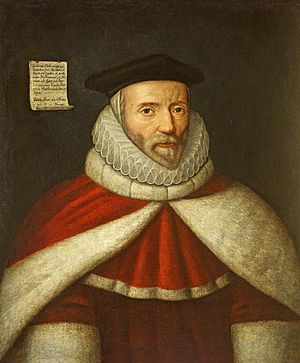John Croke facts for kids
Sir John Croke (born 1553 – died 20 January 1620) was an important English judge and politician. He served as the Speaker of the English House of Commons from October to December 1601. He was also the Recorder of London, which meant he was a chief legal officer for the city. He was elected to Parliament for the City of London in 1601. Sir John Croke was the last Speaker before Queen Elizabeth I passed away in 1603.
Contents
Sir John Croke's Early Life and Career
John Croke was born in 1553. His father, also named John, was a knight and a member of Parliament. His mother, Elizabeth, was the daughter of Sir Alexander Unton.
Croke started his career as a lawyer. He joined the Inner Temple in 1570, which was one of the main places where lawyers were trained. Soon after, he became a "distinguished member," meaning he was a very good lawyer. He even received a special silver bowl from the Lord Chancellor, Sir Christopher Hatton, as a reward for his excellent work.
When his father died in 1584, John Croke inherited two important properties: the Chilton manor house and Studley Priory. He built his own manor house at Studley, but later moved his family to Chilton.
Sir John Croke in Parliament
Croke first became a Member of Parliament (MP) for Windsor in 1585. Later, he was elected for the City of London in 1597.
He continued to rise in the legal world. He became a "Lent Reader" at the Inner Temple in 1596, which was a special teaching role. In 1598, he became the Treasurer of the Inner Temple, managing its money. After that, he was appointed Recorder of London. Croke was known for being very fair and careful in court, especially during a time when it was common for lawyers to try and scare each other.
In 1601, Croke was chosen to be the Speaker of the House of Commons. Everyone agreed he was the right person for the job. William Knolles, a high-ranking official, said that Croke was "a gentleman very religious, very judicious; of good conscience, and well furnished with all other parts." This meant he was seen as wise, fair, and honest.
Important Moments as Speaker
During his short time as Speaker, Croke defended the rights of MPs to speak freely. In one instance, an MP was being mocked for strongly supporting Queen Elizabeth's right to grants. Croke stepped in to make sure the MP could be heard.
Croke also played a key role in convincing Queen Elizabeth I to support a bill against monopolies. Monopolies were special rights given to certain people or companies to be the only ones selling a product or service. This often led to unfair prices and abuses. Many MPs wanted to stop these monopolies. Croke met with the Queen and explained the problems. Elizabeth I then announced that she wanted to "defend her people from all oppressions." Thanks to Croke's efforts, the House of Commons was able to move forward with laws to fix these issues.
Another important event happened during a vote on a bill about attending church. The votes were very close: 105 "yes" and 106 "no." An MP asked if the Speaker, Croke, could vote to break the tie. After hearing different opinions, Croke decided that the Speaker should only vote if there is a tie. He said he had to be "indifferent to both parties," meaning fair to everyone. This decision set an important rule for how Speakers vote in Parliament.
Croke also introduced new rules for MPs. He said they could not wear spurs (small spikes on boots) inside Parliament. He also tried to limit MPs from carrying rapiers (swords).
Queen Elizabeth I gave her famous "The Golden Speech" during this Parliament, where she told MPs it would be her last. When Parliament ended, Croke gave a speech to the Queen. He said that the peace of the kingdom was defended by her "mighty arm." But the Queen corrected him, saying, "No; but by the mighty of God, Mr. Speaker."
Sir John Croke's Later Career and Family
In the first year of King James I's reign, Croke was knighted. He was also made a "serjeant-at-law," which was a very senior type of lawyer who advised the King. In 1604, he became a deputy to the Chancellor of the Exchequer, who managed the country's money. As a serjeant, he often carried messages and bills between the Lords and the Commons.
After serving as a judge in Wales, he became one of the justices of the Court of King's Bench in 1607. This was one of the most important courts in England. He worked as a judge for almost thirteen years. Sir John Croke passed away on 23 January 1620.
Family Life
Sir John Croke's father, also named Sir John Croke, was a knight from Chilton. He was also an MP for different areas. The Croke family had a long history, with connections to many royal families in Europe.
Sir John Croke married Catherine, the daughter of Sir Michael Blount. They had several sons:
- Sir Henry became an MP for Christ Church.
- Charles became a clergyman.
- Unton was an MP for Wallingford and a lawyer. He supported the Roundheads during the English Civil War.
Sir John Croke's eldest son, also named Sir John, inherited his properties and became an MP for Shaftesbury. The family line continued for a few more generations, but eventually ended.
See also
- Croke baronets
 | Georgia Louise Harris Brown |
 | Julian Abele |
 | Norma Merrick Sklarek |
 | William Sidney Pittman |


